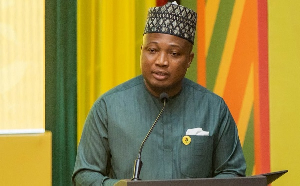Government has not abandoned its decision to invite Private Sector Participation(PSP) into the distribution of urban water supply, according to Minister of Works and Housing Yaw Barimah.
In an address read on his behalf at the annual Mole conference held at Sokagope in the Volta Region, the minister said the PSP has been put on hold and would take off in March next year.
Mole conference is a coalition of stake-holders in water and sanitation. The first conference was organized in Mole in the Northern Region. That is how the conference came to be named after Mole.
"I want to say the government is still committed to this cause and the fact that we needed to sharpen the rough edges of some aspect of the contract and also remove all grey areas so as to get the best out of it has delayed the take off time to next year," according to the minister's statement.
The Minister said the government could not claim that the option of private sector participation would by itself be a panacea to the nation's urban water problems but the financial constraints and other problems makes it the most viable option open to Government.
The Minister said the United Nations General Assembly declaration of 1981-1990 declared a decade during which the international community decided to make Drinking Water and Sanitation a cornerstone of rural development, through the launching of the National Rural Water Supply and Sanitation Programme (NRWSSP) in 1994 to enhance water and sanitation delivery.
"Seven years after the launching of the NRWSSP to extend the coverage of rural water and sanitation facilities to 85% of the rural population by the year 2009, clean water and adequate sanitation is still a mirage to millions of Ghanaians." Barimah said.
The Chairman of the Round Table of NGO's in Water and Sanitation in Ghana, Ambrose Dery, said a coalition of NGOs working in water and sanitation sector would facilitate the healthy discussion of divergent views and concepts in water and sanitation delivery in Ghana.
"Happily, there appears to be a consensus within the divergent views that the interest of the poor and vulnerable in society should be protected," Dery said.
Gordon Mumbo, Country Representative of WaterAid, a British Charity operating in the country, which has been sponsoring the Mole Conferences since it started thirteen years ago, said the task of providing clean and potable water for all is huge and no one organisation can go it all alone. "We need to move together. The country has seen huge investments in the sector but still we are far from reaching the entire population." Mumbo said.
"By inviting relevant NGOs to create a National Coalition in the water and sanitation sector, we hope to catalyze a dynamic process focusing on the importance of people having access to water and sanitation including government and donors."
In another development, a number of major Non Governmental Organisations (NGOs) operating in the country's water sector have agreed to form a coalition to be launched within the next four months.This comes after several attempts in the past had failed to yield fruitful results.
Apart from having a common voice , participants agreed that there is the need for the coalition to maximize resources of members and to influence policy change.
The measures adopted to ensure their deliberation comes to fruition, included the setting up of a three-man working committee which was appointed to organise and establish a secretariat and a national conference to adopt a constitution and formally outdoor the coalition.
Although individual organisations have their own goals and mission, it was generally agreed that the coalition would speak with one voice.
The deputy Executive Director of the Integrated Social Development Centre (ISODEC), Bishop Akolgo, who spoke on the topic Financing NGO Coalition, Opportunities and Challenges cautioned against taking too much money from one organisation which may later exert a lot of influence within the coalition.
Akolgo said water is life and is a human right and as such must remain in public hands. "We need to keep water and sanitation in the hands of the public power." The ISODEC Deputy Director was of the opinion that a network of NGOs would be better than a Coalition of NGOs.
Nana Asantewa in a response said the findings revealed that majority of the members favoured a coalition. She admitted though that her survey did not cover a large number of NGOs citing time constraints and other difficulties.
In an interview with Public Agenda after the conference, an adviser with DANIDA on Community Water and Sanitation Agency (CWSA), Ulrik Netterstrom, welcomed the creation of the e coalition. "Now I believe within four or six months we will have our coalition in Water and Sanitation sector," Netterstrom said.
Asked why the creation of the coalition has become crucial, Netterstrom said the general trend these days and particularly in the West, is that civil society were given a strong voice and recognition. "The coalition is one of the means to hear from those who are not normally heard in society," he said.
Nashiru Bawa, a representative of Community Live Improvement Programme (CLIP) a local NGO sponsored by DANIDA, congratulated members of the coalition .
General News of Sunday, 10 November 2002
Source: Public Agenda












